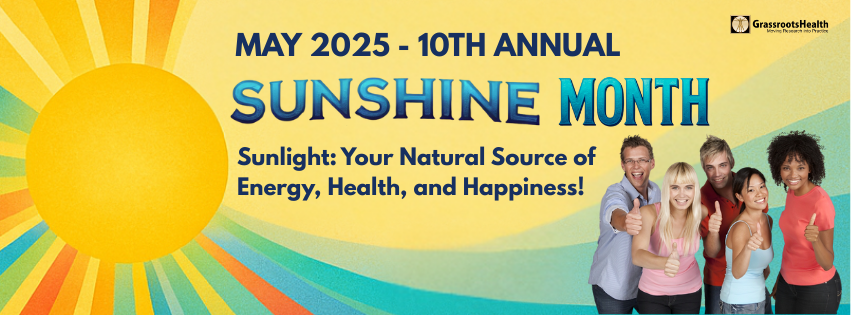
May is Sunshine Month!
Get the Sunshine eBook FREE with any purchase, donation or newsletter sign-up during the month of May
Sunlight fuels more than just vitamin D — it influences your brain, gut, heart, and whole-body wellness. Download your free guide – Learn the truth about the many benefits of sunshine for our health and how to incorporate sun exposure safely based on individual factors
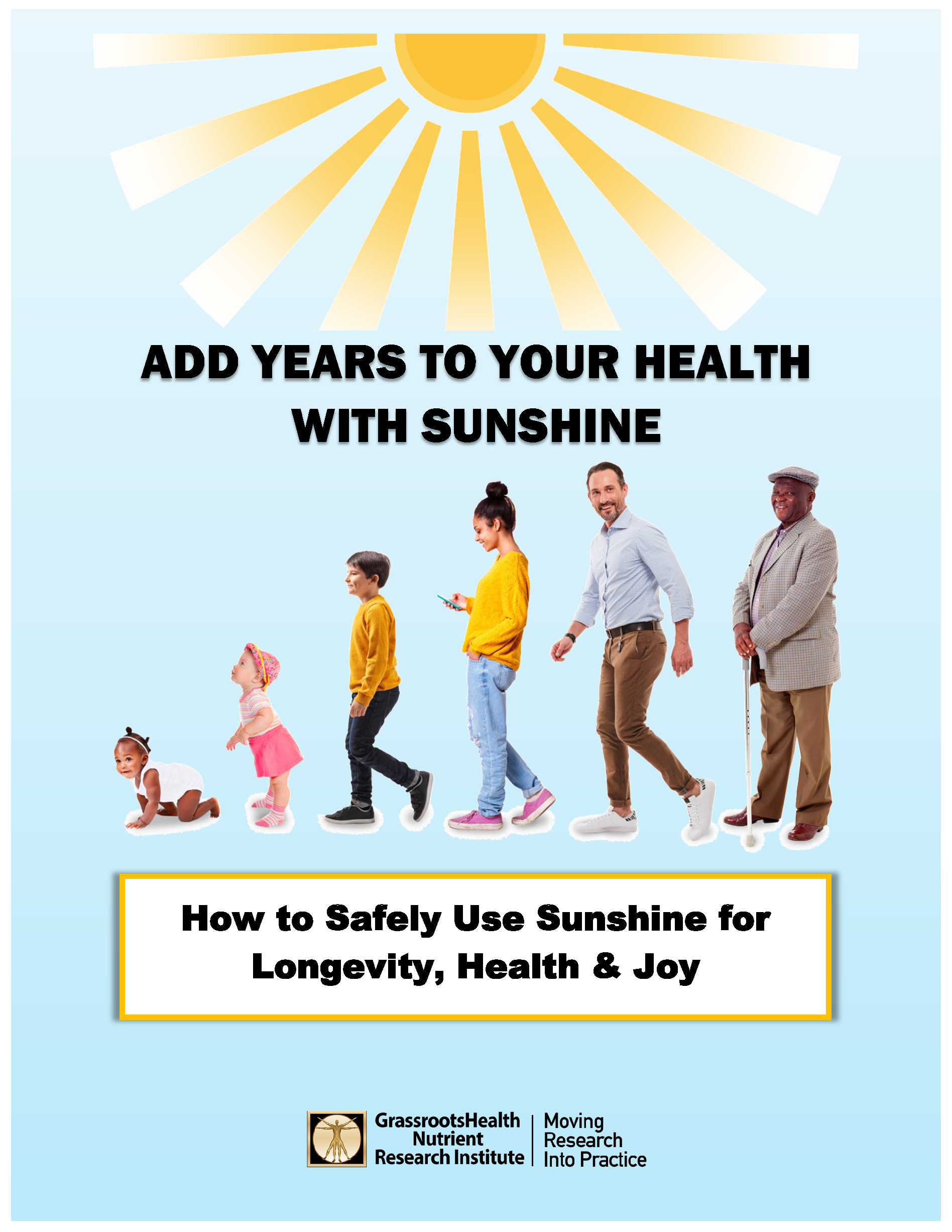
With our FREE sunshine eBook, you will learn:
- the health benefits of sunshine
- what happens in our bodies when exposed to sunshine
- how and when to make vitamin D from sun exposure and how this is different from taking a supplement
- how to utilize sensible sun exposure to minimize the risks of sun exposure and maximize the benefits for skin and overall health
- and more…
SUNSHINE MONTH BUNDLE! Get 2 Vitamin D test kits (one for now, one for after summer) plus the Sunshine eBook FREE for a special price of $130 (a value of $173)
Use the eBook to Learn How to Use Sunshine for Your Best Health!
New information has been available and published pushing for updated sun exposure guidelines for several years — but what is the chance that you heard anything about it?
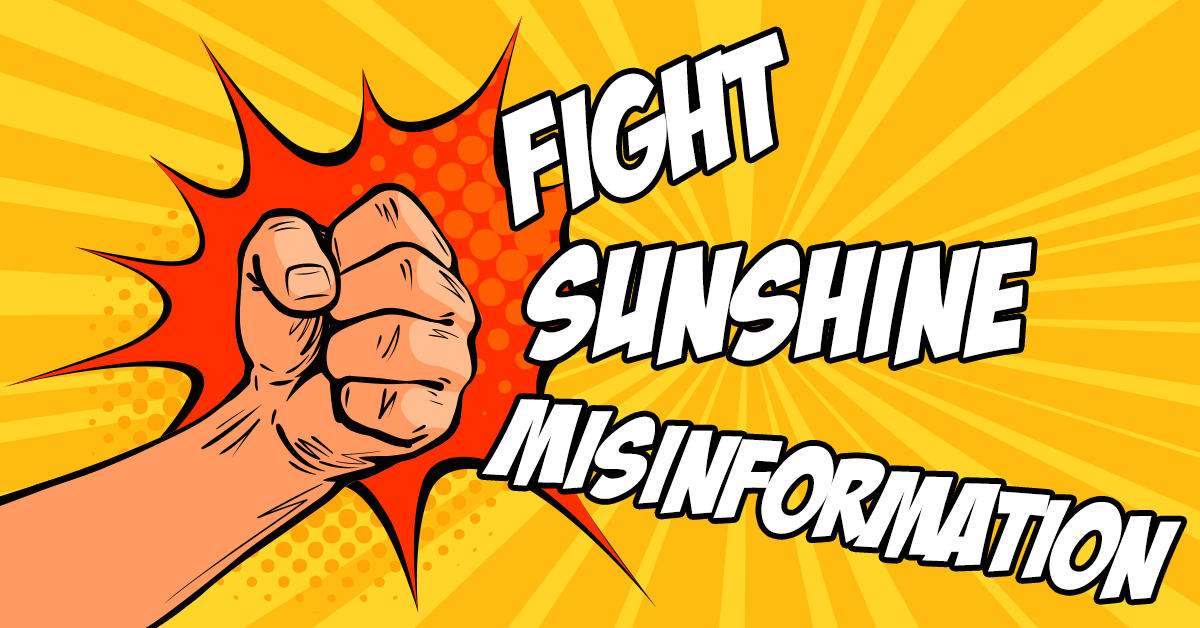
Were you aware that
- in 2016, a meeting sponsored by the US National Cancer Institute called for updated sun exposure guidelines based on individual risk factors, highlighting the beneficial effects of sun exposure, including vitamin D production and nitric oxide release, stating “Reducing risk for one disease should not come at the cost of increasing risk for another.”
- in February, 2022, the World Health Organization hosted a webinar, “Striking a balance: harms and benefits of sun exposure,” which discussed the benefits of sunshine exposure, most notably the production of vitamin D, with an emphasis on how the balance of benefits and harms differs by skin type.
- in March 2023, Australia became the first country to provide updated guidelines for sun exposure based on skin type, risk of skin cancer, and risk of vitamin D deficiency, officially recommending increased sun exposure for darker skinned people. The recommendations are endorsed by the Cancer Council Australia, Skin Cancer College Australasia, Australasian College of Dermatologists, Healthy Bones Australia, The Australian and New Zealand Bone and Mineral Society, Melanoma Patients Australia, and MS Australia.
Harness the power of sunshine for your health by learning how to balance the risks and benefits of sun exposure based on your individual risk factors. Get your eBook today with your Newsletter Sign-up, Donation, or Purchase (save 10% with code SUNMONTH25)! Or, purchase the Sunshine Month Bundle (2 Vitamin D test kits plus the eBook) to test how this summer’s sun supplements your vitamin D level.
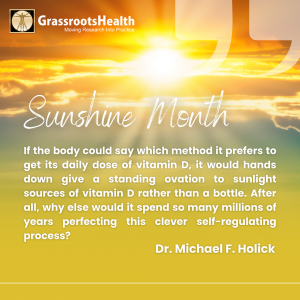 |  | 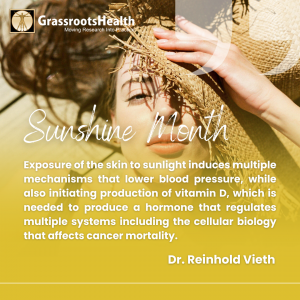 |
Learn Now: A Review of Sunshine Month Information
- How to Make Vitamin D from Sunshine
- These Diseases Could be Reduced by Getting More Sunshine
- How Sunlight Exposure Affects Immune Health and Viral Spread
- Health-Promoting Reactions in the Body Triggered by Exposure to Full-Spectrum Sunlight
- How to Determine Your Skin Type to Know What Amount of Sun Exposure is Right for You
- Vitamin D3 Production Slows with Age
- How UVB Influences Our Gut and Skin Microbiome
- Sunlight Induced Mitochondrial Melatonin and Other Sources
- Sunshine Exposure Can Affect How Long You Live
- Could getting more sunshine improve the health of your gut
- Improve Your Brain Power and Mood with Sunshine and Vitamin D
- What is the Real Relationship between Sun Exposure, Skin Cancer, and Vitamin D?
- Could Exposure to Natural Daylight Impact Metabolism and Diabetes Risk?
- Many Types of Cancer Reduced with Higher Amounts of Lifetime UVB and Sunshine Exposure
- Can Artificial Sunlight from Indoor UV Devices Benefit Health?
- Address Specific Health Issues Using Innovative UV and Light Products
- New Study Demonstrates Need for Tailored Vitamin D Recommendations based on Several Factors
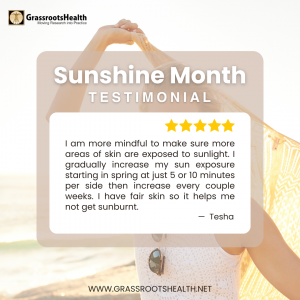 | 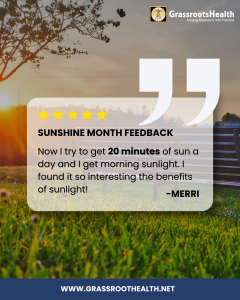 | 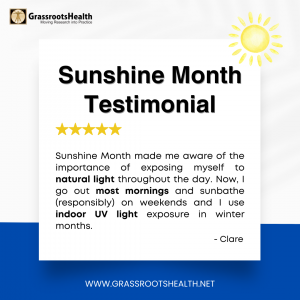 |
Quotes from Geller et al., JAMA Dermatology (2018)
“A shift toward nuanced messaging, or “precision targeting,” has considerable potential.”
– HINT: this precision targeting includes measuring your vitamin D level!
“Sun protection strategies must reflect the understanding that human skin pigmentation evolved to balance the negative and positive effects of sun exposure…”
“New data from research in skin biology, cancer epidemiology, physiology, and skin pigmentation genetics are leading to a more nuanced understanding of the reactions of human skin to UVR. This information is making it possible to develop sun safety programs that emphasize assessment of individual risk based on ancestry, age, location, and lifestyle.”
“…although the harms associated with overexposure outweigh the benefits, the beneficial effects of UVR exposure should not be ignored in developing new sun safety guidelines.”
Vitamin D Status Can be an Indicator of Having Received Sufficient Sun Exposure
According to Australia’s 2023 position statement
“Avoiding the sun and using dietary sources and/or vitamin D supplements to meet vitamin D requirements may seem an attractive solution. However, exposure to UV radiation may have benefits independently of vitamin D, particularly for the immune system, with adequate vitamin D status being an indicator of having received sufficient sun exposure to obtain other benefits. Further, exposing the eyes to longer wavelengths in sunlight reduces the risk of myopia, influences circadian rhythm, and improves sleep and mood. Aside from the direct benefits of sunlight, spending time outdoors facilitates physical activity, which plays a vital role in maintaining health and well-being. Thus completely avoiding sun exposure is not optimal for health.”
The body is designed to produce vitamin D in the skin upon exposure to UVB radiation from sunshine. The vitamin D level is therefore often used as a measurement for adequate sun exposure, and especially for those who don’t supplement with vitamin D, a vitamin D deficiency can also indicate “sunshine deficiency.”
Save 10% with code SUNMONTH25, and keep in mind that there are many benefits to sunshine exposure beyond vitamin D – go out and get some sun! Purchase the Sunshine Month Bundle (2 Vitamin D test kits plus the eBook) to test how this summer’s sun supplements your vitamin D level.
Videos
How is sunshine good for me?
Sun exposure is good for our bodies as long as we don’t burn. Sunshine exposed to our skin gives us vitamin D, lowers blood pressure, protects against future sun damage, boosts the immune system, relieves pain, promotes relaxation, heals wounds, and regulates circadian rhythm, just to name a few.
According to Dr. Pella Lindqvist, we also live longer when we use the sun sensibly and avoiding the sun carries the same risk factor for death as smoking.(1)
In the following short video, Dr. Michael Holick talks scientifically about the benefits of sunshine, besides the production of vitamin D. It makes beta-endorphins – improving your mood. It produces nitric oxide – lowering blood pressure. It makes 5-6 additional vitamin D-like photoproducts – which help with overall skin health. Watch Now
A vitamin D level within 40-60 ng/ml is associated with reduced incidence of many diseases such as cancer, MS, diabetes, and more.
Why have we been told to stay out of the sun? Or to use sunscreen? Or to cover up?
That recommendation comes from the risk of skin cancer and melanoma. Listen to this TED talk by Dr. Richard Weller titled, “Could the Sun Be Good for Your Heart?“. He argues that while there is a chance of getting skin cancer, sunshine provides vitamin D and other benefits that lower your risk of all cancers. Would it be better to have some skin cut off when you are 60? Or get breast cancer when you are 40?
According to a 2012 study, the risk of melanoma is based on the following criteria: hair color, Fitzpatrick skin type, freckling, family history of melanoma, total-body nevus count, large nevi (> 5mm), sunburn history. Take this online quiz from the Harvard School of Public Health to assess your risk of melanoma.
In another short video, Dr. Robert Heaney, GrassrootsHealth Research Director, answers the question “Is it OK to go out in the sun without sunscreen?” He says, “Yes!” He describes how natural it is to go outside in small doses and get sunshine, to enjoy the outdoors. Watch Now
All in or all out?
Typically things aren’t that black or white. While sun exposure could cause skin cancer or melanoma, avoiding the sun could put you at risk for a slew of other diseases. The best bet is to understand how to get sensible sun exposure – to not burn.
A healthy life includes sunshine. Enjoying the sun safely, while taking care not to burn, can help to provide the benefits of vitamin D without unduly raising the risk of skin cancer. The following are the three factors to take into consideration before going out in the sun.
Three Keys to Smarter Sun Exposure
Skin Type
Skin type is very important when planning your sun exposure. The statement that “15-30 minutes of midday sun is plenty” is just NOT TRUE for many people. That might be true if you are a Fitzpatrick skin type II. It is definitely NOT TRUE you are a Fitzpatrick skin type VI.
UV Strength
You can spend time outdoors at 7pm and be guaranteed never to burn. Why? The UV strength is minimal or non-existent at that time (in most parts of the globe). Understand your latitude, the time of year, and the time of solar noon. Cloud cover, smog, altitude all affect UV strength. The higher the UV strength – the shorter your time in the sun.
Duration
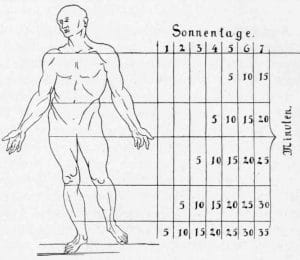 Figure out your goal sunshine time based on the amount of vitamin D you would like to get, UV strength, how much body you are exposing, and your skin type. If you haven’t been out in the sun for several months (over a long winter), don’t try to take it all in at once. Work slowly and acclimate your skin to the sun over time, as explained in the acclimation chart.
Figure out your goal sunshine time based on the amount of vitamin D you would like to get, UV strength, how much body you are exposing, and your skin type. If you haven’t been out in the sun for several months (over a long winter), don’t try to take it all in at once. Work slowly and acclimate your skin to the sun over time, as explained in the acclimation chart.
Dr. Alexander Wunsch presented this chart in a presentation on the history of sun therapy. This illustration demonstrates how light therapists gradually acclimate the body to light (sun or lamp). Session 1 you only expose the feet to 5 minutes of light. Session 2, after 5 minutes of exposure only on the feet, a blanket is raised to expose the lower leg along with the feet for an additional 5 minutes, and so on. This is a very gradual process.
Check Your Vitamin D Levels Today!

